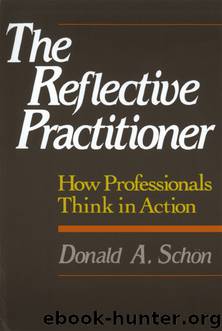The Reflective Practitioner by Schon Donald A

Author:Schon, Donald A. [Schön, Donald A.;]
Language: eng
Format: epub
ISBN: 9780786725366
Publisher: Basic Books
7
Town Planning: Limits to Reflection-in-Action
The Evolving Context of Planning Practice
Town planning has a charter membership in Glazer’s society of minor professions. The institutional context of planning practice is notoriously unstable and there are many contending views of the profession, each of which carries a different image of the planning role and a different picture of the body of useful knowledge. At the present time, for example, planners function variously as designers, plan makers, critics, advocates of special interests, regulators, managers, evaluators, and intermediaries. In planning as in other professions, each role tends to be associated with characteristic values, strategies, techniques, and bodies of relevant information. But in the planning profession, images of role have evolved significantly in relatively brief periods of time. The profession, which came into being around the turn of the century, moved in succeeding decades through different ideas in good currency about planning theory and practice, partly in response to changes in context shaped by planners themselves. The history of the evolution of planning roles can be understood as a global conversation between the planning profession and its situation.
With the development of the city planning movement in the early years of this century, planners first gained visibility, power, and professional status. The growth of comprehensive and master planning and the widespread establishment of local planning commissions in the United States paralleled the formation of the coalition supportive of town planning in Britain.1 Following World War II, probably as a result of military and economic planning in wartime America, the idea of central planning extended its scope from comprehensive and master planning for towns to such fields as urban renewal, urban and regional transportation, health services, public education, mental health, and criminal justice.
In these domains, among many others, the centralist planner operated from the base of institutions created and legitimized through legislation brought into being by a coalition of political forces. The planner framed his role at the center of a system for which he planned, in relation to agencies which would implement his plans and clienteles who would benefit from them. His system of knowledge-in-practice dealt with the framing of objectives and goals, the imagining of a desirable future, the description of baseline conditions, the identification of alternative strategies of action, the description of constraints to be circumvented or removed, the mapping of the system to be influenced, and the prediction of the consequences of action. Later, planners also came to be concerned with the feasibility of implementing plans and the political problems of “selling” them.
Through the mid-1960s, centralist planning proceeded in this mode. Its operations were based on two main assumptions:
1.There is a working consensus about the content of the public interest, sufficient for the setting of planning goals and objectives, and
2.There is a system of knowledge adequate for the conduct of central planning.
It does not matter that these assumptions may never have been true. They were widely believed to be true, and they set the terms of reference for the planning profession. But by the mid-1960s, both assumptions were in trouble.
Download
This site does not store any files on its server. We only index and link to content provided by other sites. Please contact the content providers to delete copyright contents if any and email us, we'll remove relevant links or contents immediately.
| Administration & Medicine Economics | Allied Health Professions |
| Basic Sciences | Dentistry |
| History | Medical Informatics |
| Medicine | Nursing |
| Pharmacology | Psychology |
| Research | Veterinary Medicine |
The Art of Thinking Clearly by Rolf Dobelli(10489)
The 5 Love Languages: The Secret to Love That Lasts by Gary Chapman(9815)
Mindhunter: Inside the FBI's Elite Serial Crime Unit by John E. Douglas & Mark Olshaker(9343)
Becoming Supernatural by Dr. Joe Dispenza(8217)
Nudge - Improving Decisions about Health, Wealth, and Happiness by Thaler Sunstein(7706)
The Road Less Traveled by M. Scott Peck(7603)
Mastermind: How to Think Like Sherlock Holmes by Maria Konnikova(7347)
Enlightenment Now: The Case for Reason, Science, Humanism, and Progress by Steven Pinker(7313)
Win Bigly by Scott Adams(7198)
The Way of Zen by Alan W. Watts(6614)
Factfulness: Ten Reasons We're Wrong About the World – and Why Things Are Better Than You Think by Hans Rosling(4742)
The State of Affairs by Esther Perel(4721)
Gerald's Game by Stephen King(4654)
Man's Search for Meaning by Viktor Frankl(4606)
The Confidence Code by Katty Kay(4260)
Thinking in Bets by Annie Duke(4227)
The Healing Self by Deepak Chopra(3578)
Hidden Persuasion: 33 psychological influence techniques in advertising by Marc Andrews & Matthijs van Leeuwen & Rick van Baaren(3565)
The Worm at the Core by Sheldon Solomon(3487)
